How to book multiple trips for the price of one by maximizing United's routing rules
Update: Some offers mentioned below are no longer available. View the current offers here.
The key to maximizing any airline frequent-flyer program is understanding its rules and then using them to your advantage. That's gotten a lot harder as many major airline programs have changed how flyers can earn and redeem their miles. In particular, Delta and United have both removed award charts from their sites, raised redemption levels repeatedly, and even begun to price award tickets dynamically so that they more directly correlate to airfares. All that has made it even more difficult to get as much value as before from their mileage programs. Difficult, but not impossible.
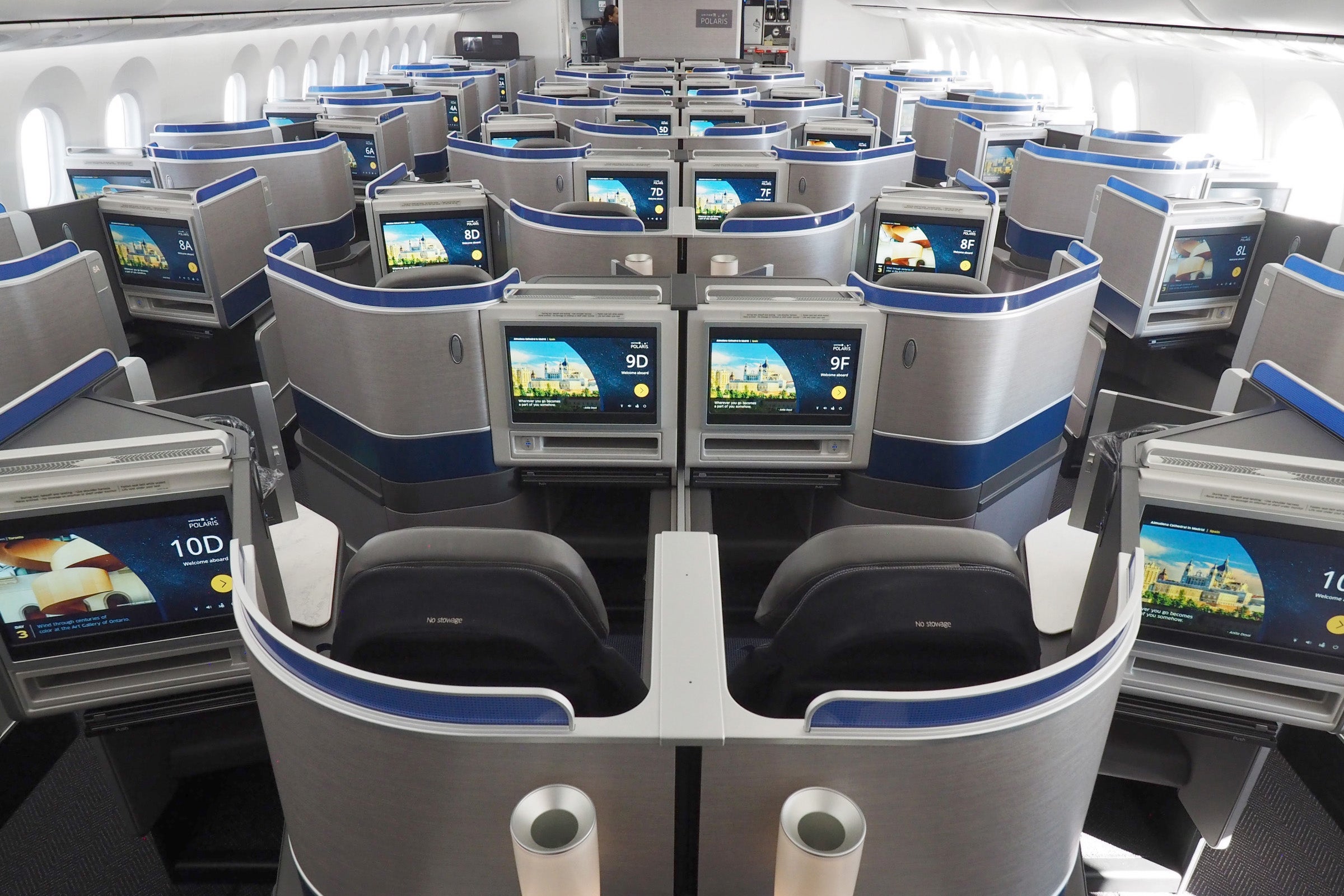
In fact, there are still a lot of opportunities to leverage with the United MileagePlus program in particular, if you know where to look. Today, we're going to take a deep dive into United's award rules, including how it prices flights on its own metal as well as partners, the associated fees, and some hard-and-fast guidelines you can use to book the tickets you want.
[table-of-contents /]
Be aware of Fees
Although award travel is often thought of as "free," you can actually get dinged with tons of fees for everything from changing your plans to making a last-minute booking. Luckily, United has eliminated many of these fees in the past year due to the pandemic. There are still a few to be aware of, though. You can find United's fee schedule on this page.
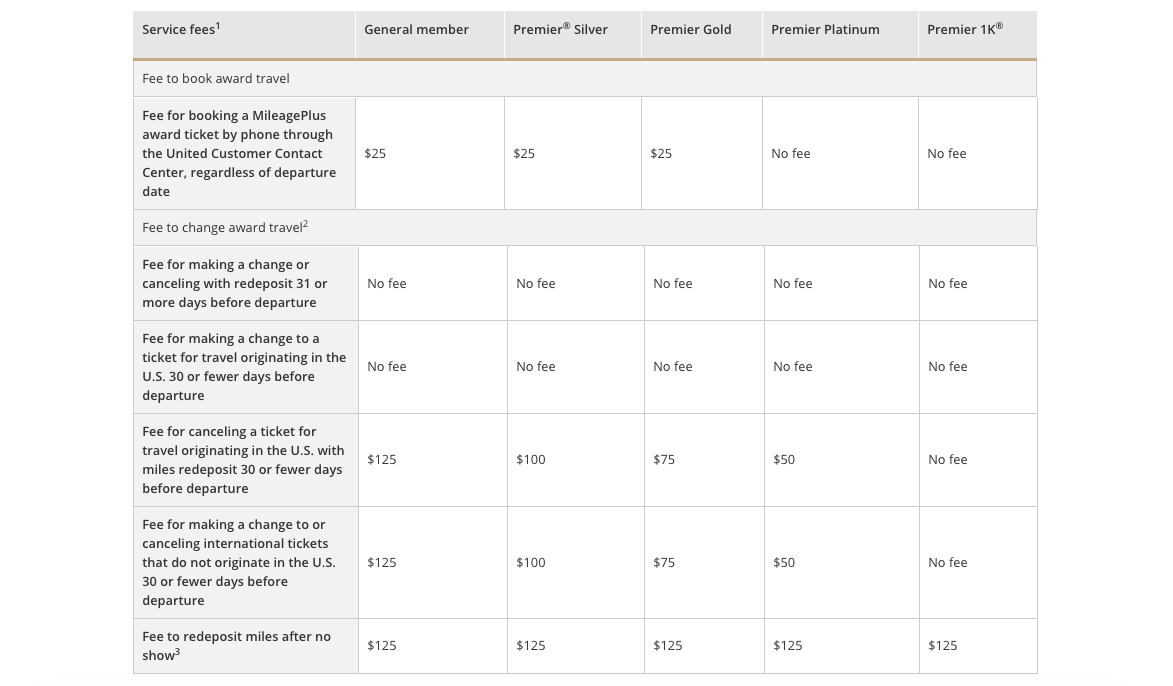
Phone booking fee
It'll set you back $25 to book an award over the phone, though it is waived for Premier Platinum, 1K and Global Services elites.
Close-in booking fee
United actually eliminated these fees, which used to range up to $75 per ticket, in November 2019, although it also raised the mileage requirements for award tickets booked within 30 days of travel, and that surcharge remains in place.
Change and cancellation fees
Due to the pandemic, United eased how it levies change and cancellation fees on award tickets. For tickets changed or canceled 31 days or more in advance of departure, there is no fee, and the same is true of changes to tickets originating in the U.S. within 30 days of travel.
However, it'll cost you up to $125 to change or cancel international tickets that do not originate in the U.S. within 30 days of departure or to cancel a ticket originating in the U.S. in that same time frame. The fee depends on your elite status. Everyone has to pay $125 to redeposit miles after a no-show, though.

Taxes, fees and surcharges
One of the ways United MileagePlus has retained its luster over the years, despite repeated devaluations, is the fact that it doesn't pass on carrier-imposed surcharges on award tickets, potentially saving flyers hundreds or even thousands of dollars on tickets. You'll still need to pay any government-imposed taxes, but these should be relatively minimal.
Related: Maximizing redemptions with United MileagePlus
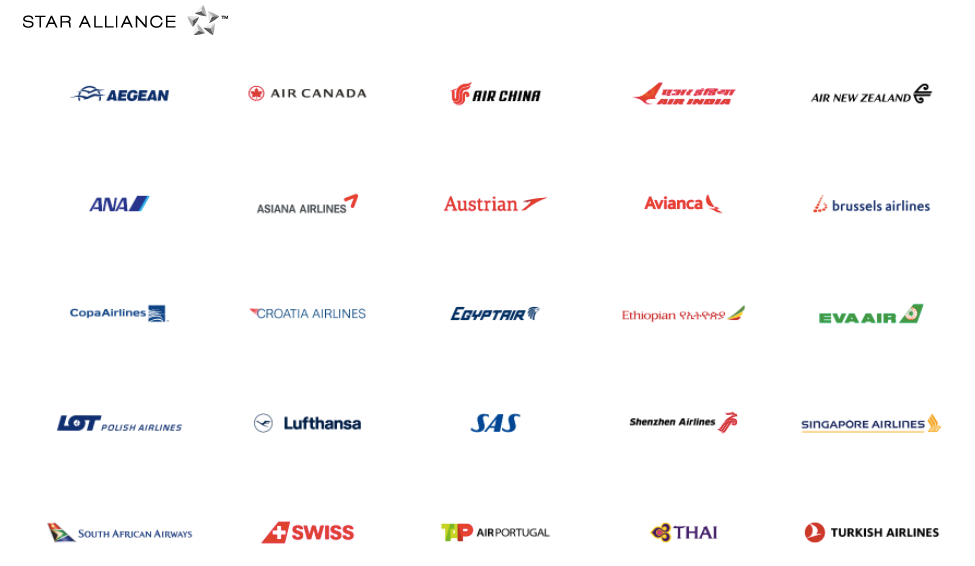
Airline partners
United is a member of the Star Alliance, so you can earn and redeem miles on the following airlines:
- Aegean
- Air Canada
- Air China
- Air India
- Air New Zealand
- ANA
- Asiana
- Austrian Airlines
- Avianca
- Brussels Airlines
- Copa
- Croatia Airlines
- Egyptair
- Ethiopian Airlines
- EVA Air
- Juneyao Air (connecting partner)
- LOT Polish Airlines
- Lufthansa
- SAS
- Shenzhen Airlines
- Singapore Airlines
- South African Airways
- SWISS
- TAP Air Portugal
- THAI
- Turkish Airlines
United also has the following non-alliance partners:
- Aer Lingus
- Aeromar
- Air Dolomiti
- Azul
- Boutique Air
- Cape Air
- Edelweiss
- Eurowings
- Hawaiian Airlines (non-Mainland U.S. flights)
- Olympic Air
- Silver Airways
- Vistara
Related: Book this, not that: Star Alliance award flights
Award prices
Now that you know all airlines you can earn and redeem United MileagePlus miles on, it's time to figure out how many miles you'll need to redeem to fly them, and here's where things get tricky. As mentioned above, United no longer publishes award charts with set mileage levels between different regions, whether you're flying on United planes or those of its partners. Instead, the airline now employs dynamic pricing, which means the higher the airfare for a particular ticket, the more miles you can expect to spend.
On the plus side, cheap seats, like short economy flights, have actually gone down in price and are subject to frequent award sales. However, the most sought-after products – namely long-haul international business- and first-class cabins – can be downright exorbitant, with mileage levels that fluctuate dramatically depending on the season and even the exact day.
To find out how much your desired award itinerary will cost, you're probably just going to have to log into United.com with your MileagePlus credentials and do a few searches to see what you come up with. Be sure to look at the 30-day calendar to get an idea of the range of mileage prices and try to home in on days with the lowest numbers. Despite all that uncertainty and variability, the most inexpensive awards tend to look pretty similar to the set "saver" pricing from before United pulled its award charts.
That means you can typically find flights on United between the U.S. and Europe for 30,000 miles each way in economy and 60,000 in business class, and from North America to Asia for around 35,000-40,000 miles in economy and 70,000-90,000 in business class one-way, depending on where you're flying precisely. Tickets to the South Pacific, including Australia, or Africa will typically start at 40,000 miles each way in economy and 80,000-90,000 in business class. Expect tickets on partners to cost 10% more across the board.
That said, prices can and often do, go a lot higher than that, with business-class awards sometimes pricing out below premium-economy seats, as in this example of one-way options on United and Ethiopian Airlines between New York City (both EWR and JFK) and Cape Town (CPT) in November.
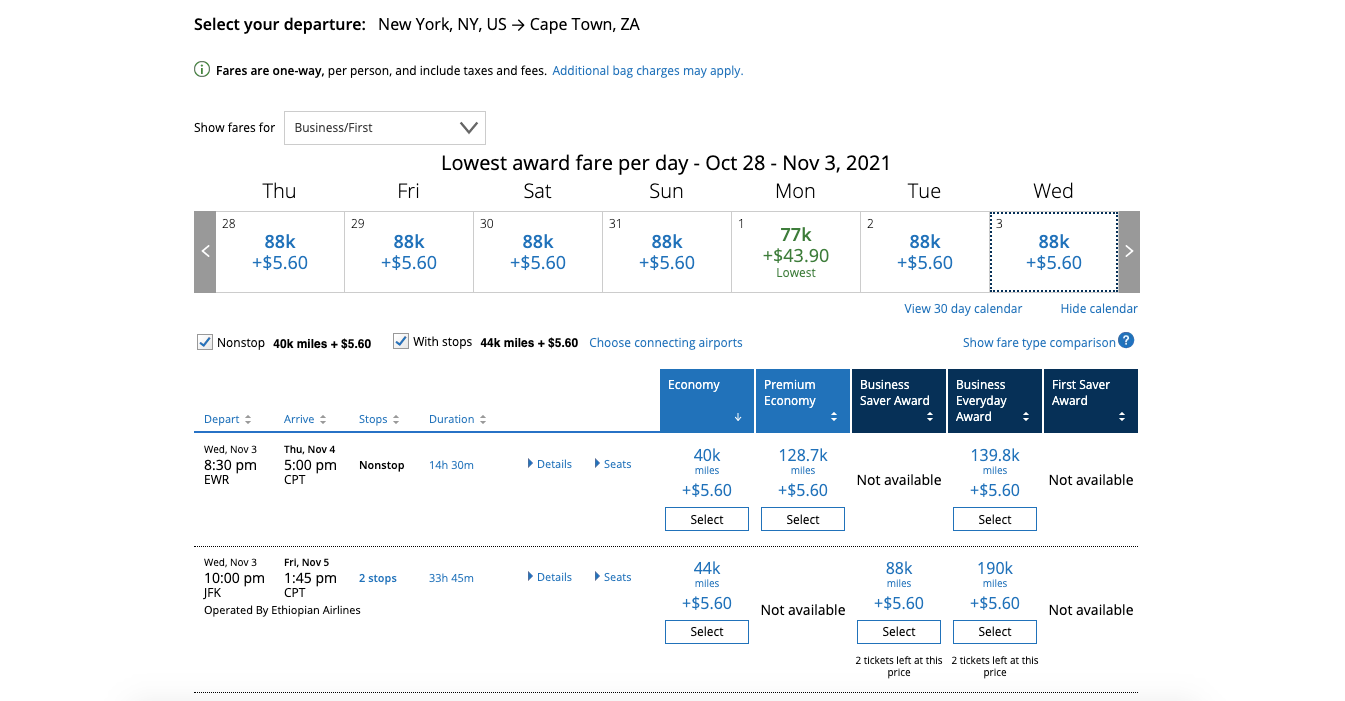
Notice that United's own flight prices out at 40,000 miles in economy while the Ethiopian Airlines itinerary is 10% more expensive at 44,000 miles. Ethiopian has both saver-level and standard award availability in business class for 88,000 and 190,000 miles, respectively. Meanwhile, United only has standard awards for just under 140,000 miles. What's odd is that United's premium economy award requires 129,000 miles, which is 41,000 miles more expensive than Ethiopian business class.
Here's another example with flights from San Francisco (SFO) to Tokyo Narita (NRT) and Haneda (HND) in October. There's plenty of United economy saver availability for 35,000 miles and premium economy for just under 98,000 miles (or 200,000, yikes!), but no saver business seats.
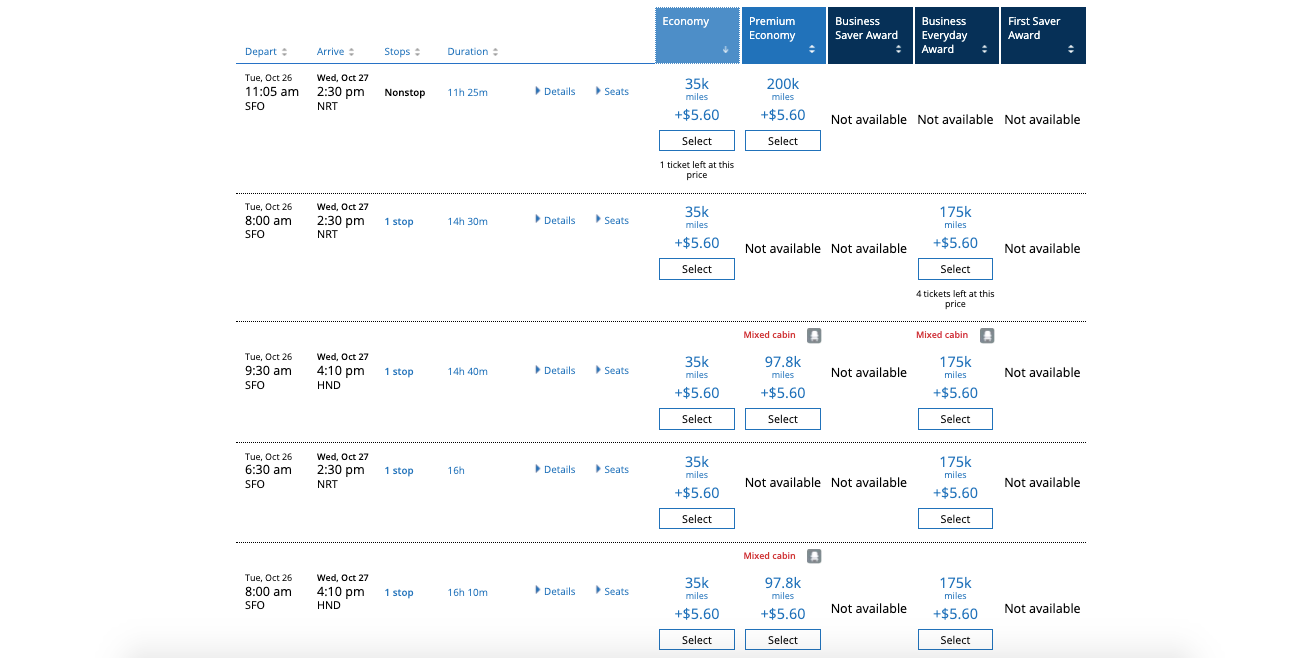
Look at what saver business-class awards are available, though, and you find a mix of ANA and Air Canada flights for 35,000 miles in economy or 88,000 miles in business class. That's 10,000 miles less to fly a superior product!
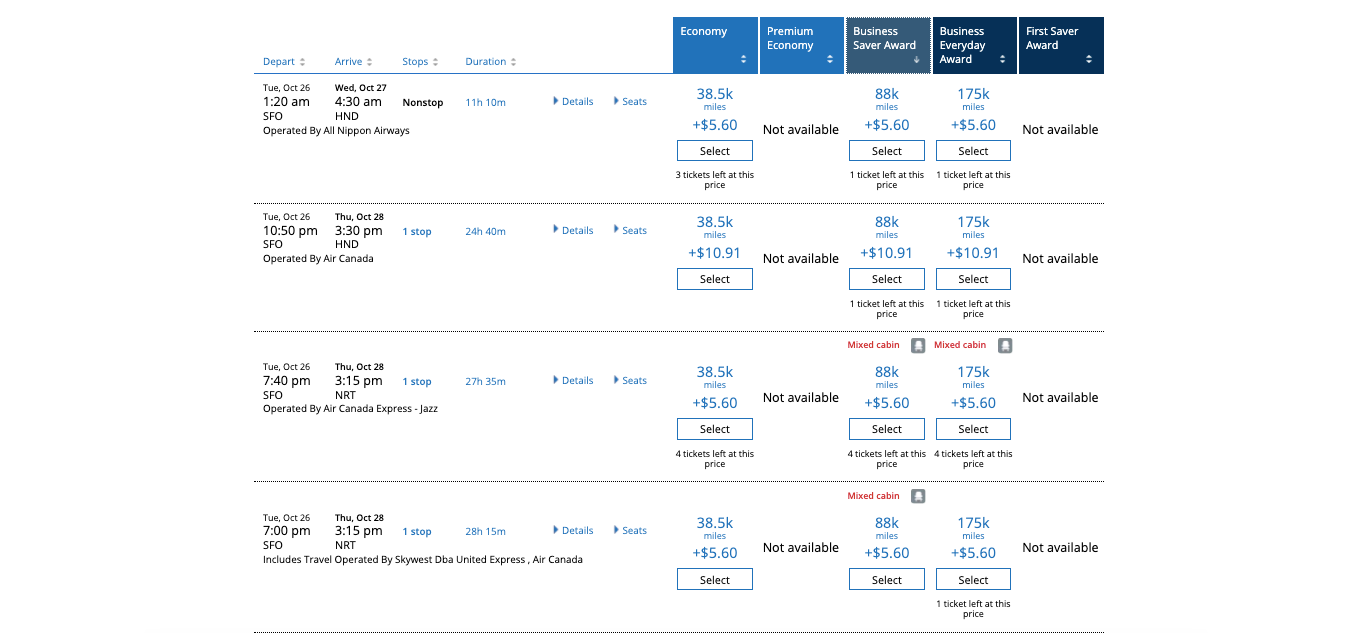
So, yes, United award pricing is wonky. Whatever you do, aim for the lower end of the spectrum no matter which cabin you're booking, always double-check business versus premium-economy award levels, and focus on partner itineraries whose pricing tends to be a bit more stable.
It's also worth noting that you might have access to additional economy award inventory if you have a United credit card. Among the cards that confer this benefit are:
- United Explorer Card
- United Club Infinite Card
- United Business Card
- United Club Business Card
The information for the United Club Business has been collected independently by The Points Guy. The card details on this page have not been reviewed or provided by the card issuer.
This perk also extends to United elite travelers, with higher tier members enjoying expanded business class award availability.
Related: The best credit cards for United Airlines flyers
Regions
Although the easiest way to know if your trip will work is simply to plug in the origin and destination and see what options United.com spits out, if you're looking to put together more complicated itineraries with multiple stops, it pays to know how United classifies regions. This will come in handy later.
| Region | Country |
|---|---|
Mainland US, Alaska, Canada | Mainland US, Alaska, Canada |
Hawaii | Hawaii |
Mexico | Mexico |
Caribbean | Antigua, Aruba, Bahamas, Barbados, Barbuda, Bermuda, Bonaire, St. Eustatius and Saba, Cayman Islands (Grand Cayman), Cuba, Curacao, Dominican Republic, Grenada, Guadeloupe, Haiti, Jamaica, Martinique, Puerto Rico, St. Kitts-Nevis, St. Lucia, St. Maarten, Trinidad and Tobago, Turks and Caicos Islands, Virgin Islands (British and U.S.) |
Central America | Belize, Costa Rica, El Salvador, Guatemala, Honduras, Nicaragua, Panama |
Northern South America | Colombia, Ecuador, French Guiana, Guyana, Peru, Suriname and Venezuela |
Southern South America | Argentina, Bolivia, Brazil, Chile, Paraguay and Uruguay |
Europe | Albania, Armenia, Austria, Belgium, Belarus, Bosnia & Herzegovina, Bulgaria, Croatia, Cyprus, Czech Republic, Denmark, Estonia, Finland, France, Georgia, Germany, Greece, Greenland, Hungary, Iceland, Ireland, Italy, Latvia, Lithuania, Luxembourg, Macedonia, Malta, Moldova, Montenegro, Netherlands, Norway, Poland, Portugal, Romania, Russia, Serbia, Slovakia, Slovenia, Spain, Sweden, Switzerland, Turkey, Ukraine, United Kingdom |
Middle East | Azerbaijan, Bahrain, Egypt, Iran, Iraq, Israel, Jordan, Kuwait, Lebanon, Oman, Qatar, Saudi Arabia, Syria, United Arab Emirates, Yemen |
Northern Africa | Algeria, Canary Islands, Libya, Morocco, Tunisia |
Central and Southern Africa | Angola, Benin, Botswana, Burkina Faso, Burundi, Cameroon, Cape Verde, Central African Republic, Chad, Comoros, Congo, Cote D'lvoire, Democratic Republic of Congo, Djibouti, Equatorial Guinea, Eritrea, Ethiopia, Gabon, Gambia, Ghana, Guinea, Guinea-Bissau, Kenya, Lesotho, Liberia, Madagascar, Malawi, Mali, Mauritania, Mauritius, Mozambique, Namibia, Niger, Nigeria, Reunion Island, Rwanda, South Africa, Sao Tome and Principe, Senegal, Seychelles, Sierra Leone, Somalia, South Sudan, Sudan, Swaziland, Tanzania, Togo, Uganda, Zambia, Zimbabwe |
North Asia | China (Mainland), South Korea, Mongolia, Taiwan |
Central Asia | Afghanistan, India, Kazakhstan, Kyrgyzstan, Maldives, Nepal, Pakistan, Sri Lanka, Tajikistan, Turkmenistan, Uzbekistan |
South Asia | Bangladesh, Bhutan, Brunei, Cambodia, Hong Kong, Indonesia, Laos, Macau, Malaysia, Myanmar (Burma), Philippines, Singapore, Thailand, Vietnam |
Japan | Japan |
Oceania | American Samoa, Cook Islands, Federated States of Micronesia, Fiji, French Polynesia, Guam, Northern Mariana Islands, Marshall Islands, New Caledonia, Palau, Papua New Guinea, Tonga, Vanuatu, Samoa |
Australia & New Zealand | Australia, New Zealand, Norfolk Island |
Knowing which countries/cities fall into which regions can be critical when it comes to routing rules as well as the Excursionist Perk, both of which we'll detail below.
Routing rules
Now for the interesting (or frustrating, depending on how you look at it) part: maximizing those miles and regions along with United's award rules to get the most out of your miles. United does publish its basic award rules. But there are a couple of important items to pull out and a couple of things that might need clarifying.
Prohibited routings
Some other carriers, notably American Airlines, have clear rules prohibiting transit between two regions on award tickets via a third region. For instance, you can't fly between the U.S. and Europe via South America. United does not publish its own rules on the topic, but we know about some based on (a lot) of award searches and feedback from other travelers.
For starters, anything that violates the basic "common sense" rule likely isn't possible. Apart from these examples where you're transiting extremely far out of the way between your origin and destination, we also know that you cannot fly from North America to Oceania or Australia/New Zealand via Europe, Africa or the Middle East.
If you want to get down under from the US, you're effectively stuck going over the Pacific, either non-stop from one of United's hubs or via Asia. In addition, travel from North America to other regions generally cannot route via South America. The one exception used to be awards to/from South Africa via Brazil on South African Airways, but that looks to be moot for the time being.
United's online award search interface (as a whole) works pretty well, so it should provide you with whatever possible routings you can take automatically.
Related: What is United Airlines elite status worth in 2021?
Maximum permitted mileage
Unlike American and Delta, United does not have what's called "maximum permitted mileage" restrictions on award tickets that we know of. That means you can choose any number of routes as long as they don't violate the rules above.
For example, you can fly from the U.S. to Asia either over the Pacific or the Atlantic via Europe, which adds a tremendous amount of flexibility and the fun of trying several different airlines. Take a look at the sample routings below, which include United's own nonstop from Newark (EWR) to Hong Kong (HKG) as well as options via Addis Ababa (ADD) on Ethiopian Airlines, Tokyo Haneda (HND) on ANA, Frankfurt (FRA) on Lufthansa, and (not pictured) Zurich (ZRH) on SWISS and Istanbul (IST) on Turkish Airlines.
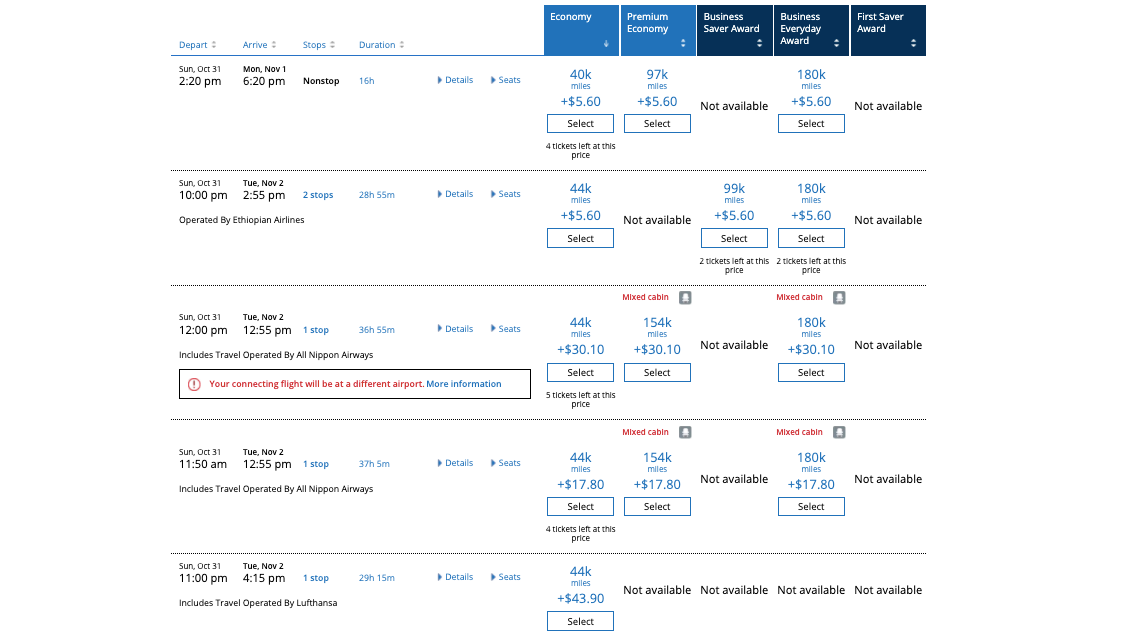
One-ways, open jaws, stopovers and the Excursionist Perk
One of the major reasons that MileagePlus remains so relevant is the amount of flexibility it gives flyers. Members can redeem miles for one-way awards and can also book itineraries with one or two open jaws (where you return to or from a different airport than the one you traveled to or from).
MileagePlus also has a unique booking feature called the Excursionist Perk. It lets travelers build an extra stop and segment into itineraries. While confusing at first glance, it's basically a way of adding a free one-way award segment to a qualifying, longer booking.
To be eligible for the Excursionist Perk, your award ticket must satisfy several requirements:
- Your travel must originate and end in the same MileagePlus-defined region, such as the Mainland US, Canada and Alaska, Europe or North Asia (told you those regions would be important!).
- The Excursionist Perk "free" segment must originate and terminate within a single MileagePlus-defined region that is not the region where your travel originates.
- You can only qualify for one Perk segment per itinerary.
- The cabin of service and award type for the Excursionist Perk segment must be the same or lower as the one-way award preceding it. So if your positioning flight is in business class, your add-on flight can be in business or economy. But if you start in economy on your first segment, the Excursionist segment can only be in economy.
The originating/ending in the same region rule might seem a little convoluted. It doesn't necessarily mean you need to book a straight-up round-trip ticket that starts and ends at the same place. Instead, you could book two one-way awards to and from different cities within the same region – what's known as an open jaw – all as part of the same reservation and then you'd be eligible for the Excursionist Perk. It's a lot. Here are two quick examples to help you get your mind around it.
Let's say you want to fly from New York-JFK or Newark (EWR) to Frankfurt (FRA), spend some time there, then move on to Paris (CDG) for a few days before flying back directly to Los Angeles from there, all in economy. Booking everything separately, you'd pay 30,000-33,000 miles each way from the U.S. to Europe plus an extra 8,800 miles for the Frankfurt-Paris segment on Lufthansa for a total of 68,800-74,800 miles. However, you could book everything together, save the 8,800 miles by getting that Frankfurt-Paris flight included as the Excursionist Perk, and end up paying just 60,000-66,000 miles for the whole thing.
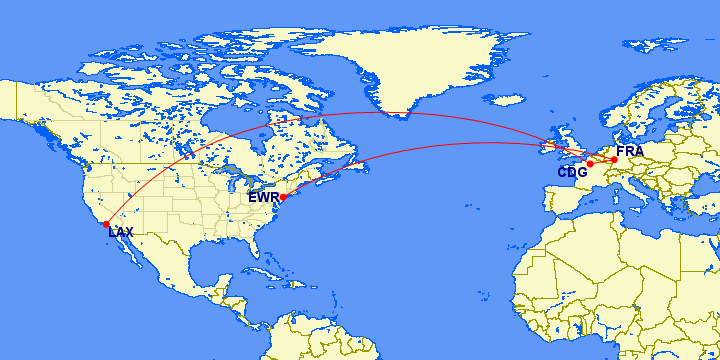
For another example that showcases the savings more starkly, let's say you wanted to fly business class from San Francisco (SFO) to Asia and visit both Hong Kong and Singapore (SIN). You could book two one-ways from San Francisco to Hong Kong and Singapore back to San Francisco for 180,000 miles on United (198,000 on partners) and then redeem an additional 27,500 miles (or pay for a separate ticket) between Hong Kong and Singapore.
However, the Excursionist perk would allow you to simply tag on the Hong Kong-Singapore segment and save the 27,500 miles.
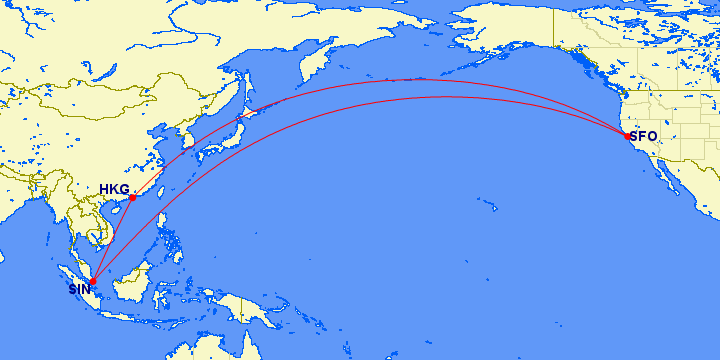
To take advantage of this quirk, you need to use the Multi-City search on United.com. Enter your various cities and dates there. Any itinerary that qualifies and where there is award availability should price out properly, with the Excursionist Perk segment showing 0 miles:
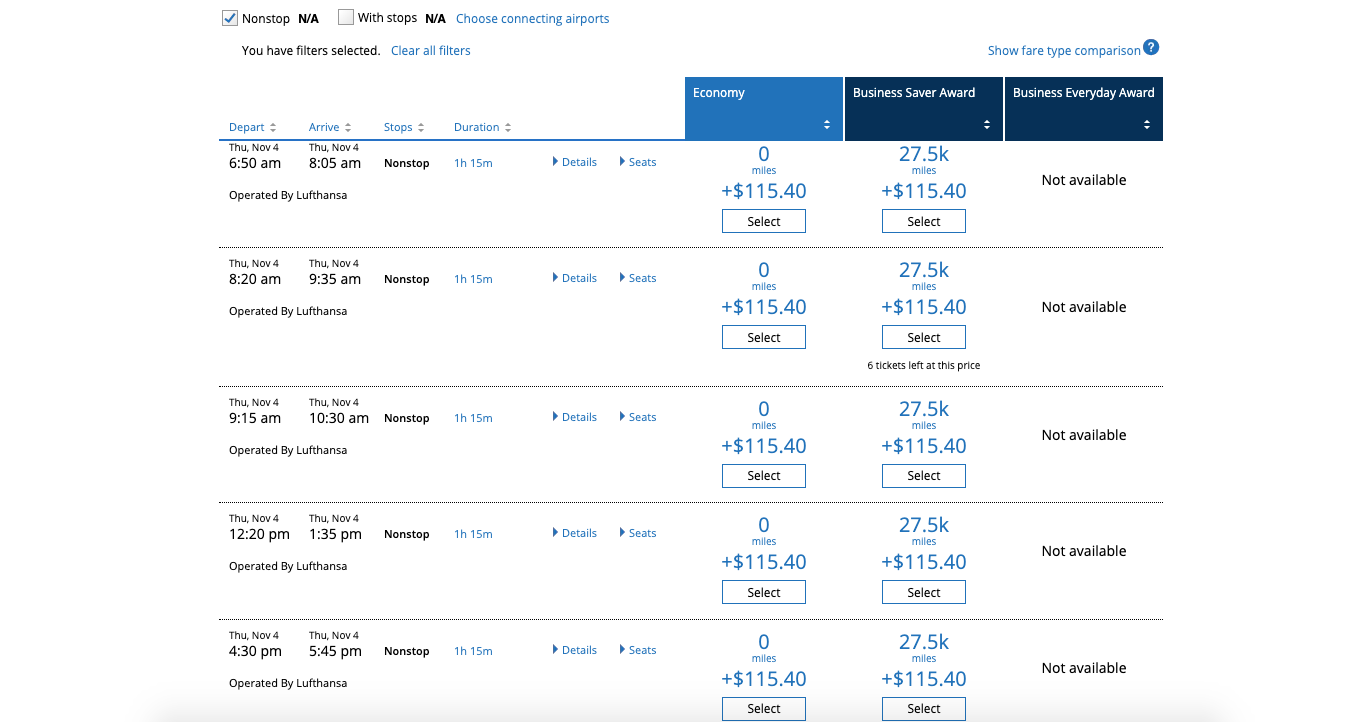
Bottom Line
Despite many recent devaluations and other changes that have complicated booking awards, United MileagePlus is still a useful frequent-flyer program thanks to its variety of partners, the still-decent award prices, the lack of fuel surcharges and minimal routing restrictions. The fact that the program is also a 1:1 Chase Ultimate Rewards transfer partner is just another added bonus that makes it that much easier to reap value from the program.

